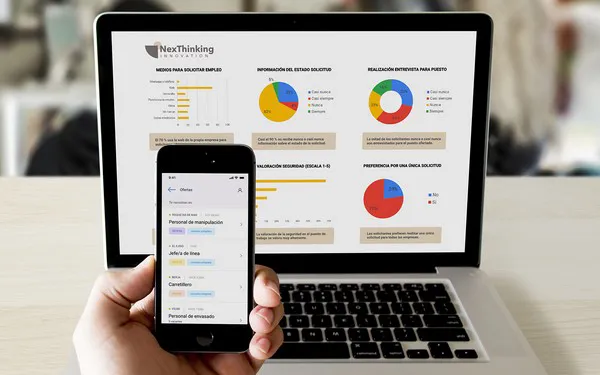Jorge Escudero, consultant of human resources and organizational development of NexThinking Innovation, in the innovation area of Treze Estudio, has analyzed the results of a survey on job applications for handling warehouses in the Almería agro-food sector.

What is the purpose of this study?
The objective of this study is to analyze and find areas for improvement in the agro-food sector. In this case, we have focused on Almería. The main goal is to help the sector improve from an innovative point of view. Innovation is largely based on analysis and the search for ideas, and that is what we do within the innovation area of NexThinking Innovation.
How did the idea come about?
We are passionate about Design Thinking, user experience and continuous improvement. We could say this is part of our DNA. We realized that there was room for improvement in the running of the demand and supply of employment in Almeria's agro-food handling warehouses, when more than 35,000 people work in the sorting, packaging, labeling, etc.
What are those areas for improvement?
From the company's point of view, the main objective is to facilitate the search and recruitment of future employees, since there are still companies with no digital processes which continue asking for paper CVs. Even in the case of those that do have forms within their web pages, we have found that scrutinizing the applications is a long and tedious process which requires plenty of the company's resources, both human and financial.
If we analyze it from the point of view of the applicants, they make a multitude of requests over and over again each time they apply for a job at each of the companies in the sector, and as we already know, there are quite a few of these in the Almería area. We believe that we could address this situation with a single application that would allow people to apply for a job and view the status of their applications with just one click on their mobile devices.
You are talking about more than 35,000 people. Do you think that you can help create a common and professional job bank?
Undoubtedly, yes. No one thought that their own company could be digitized for teleworking in record time before the health crisis; however, most have succeeded. This digitization of the sector is here to stay and the coming years will be key to improving competitiveness.
So, could we say that it is feasible to set up a common and professional job bank? It depends on several factors. For example, the sector's atomization results in decentralized job offers. As we well know, the European Union encourages cooperation to become bigger and stronger in the face of distribution chains. We are committed to cooperation in order to improve and become more competitive from an employment point of view, which can also help us in the digital transformation.
In your opinion, would it be feasible to digitize the process?
The tools or the technology are not as important as the people who are involved in decision making; they are the ones who have to work on finding solutions to improve. As I said, cooperation is key in the sector, and creating a mobile app would help both businesses and applicants. Feasibility would depend on how agro companies embrace this general solution.
Let's focus on the study. What are its most relevant conclusions?
Before doing it, we already saw how the flow of job demand and job offers was hurdled by a tedious bureaucratic process, as well as a process that was not designed for people, but for computer systems.
The most important conclusions of the study, carried out on more than 100 people of different ages and positions in handling warehouses, are:
- 80% of respondents prefer to make a single application per campaign and not go one by one, so this further supports the possibility of creating a common bank for all.
- Almost 87% of them never or almost never receive information about the status of their application. This means that multiple applications are made and there's uncertainty when having to choose one position or another.
- 70% of respondents use the website of the company itself to apply for a job. In other words, thousands of resumes arrive at the mailboxes of the human resources departments, which entails a great effort in resource management.
Other interesting data:
- 52% are not interviewed to assess their application and therefore their position.
- 57.6% do not know the conditions of the job when they apply.
- 76% value the implementation of safety and risk prevention measures at the workplace following the COVID-19 health crisis.
In conclusion, we believe that the study has confirmed what we already suspected; that is, we have identified that there are areas for improvement in the process and that the digital transformation of the sector is easy, achievable and economically viable in the short term.
 For more information: https://treze.es
For more information: https://treze.es
